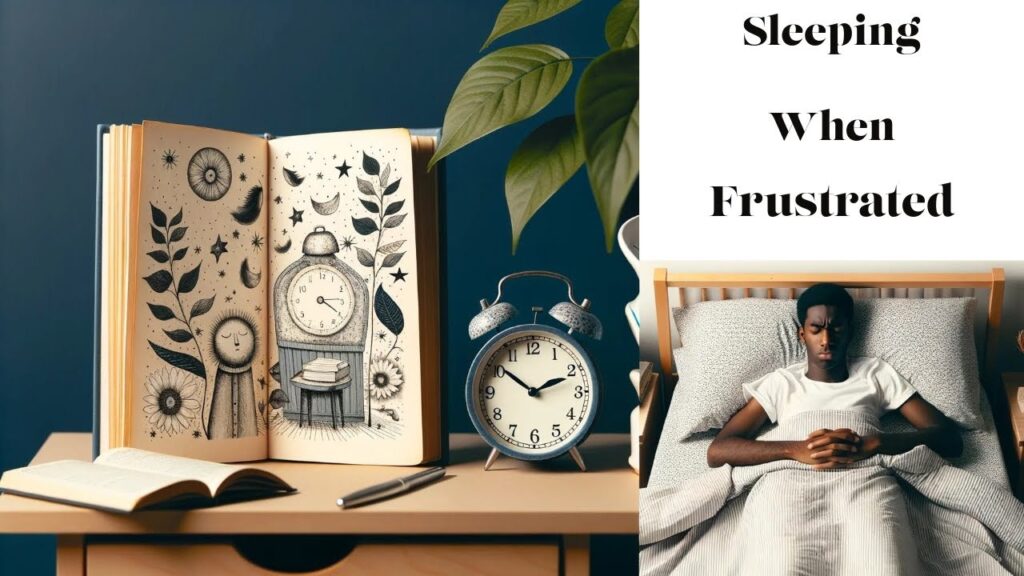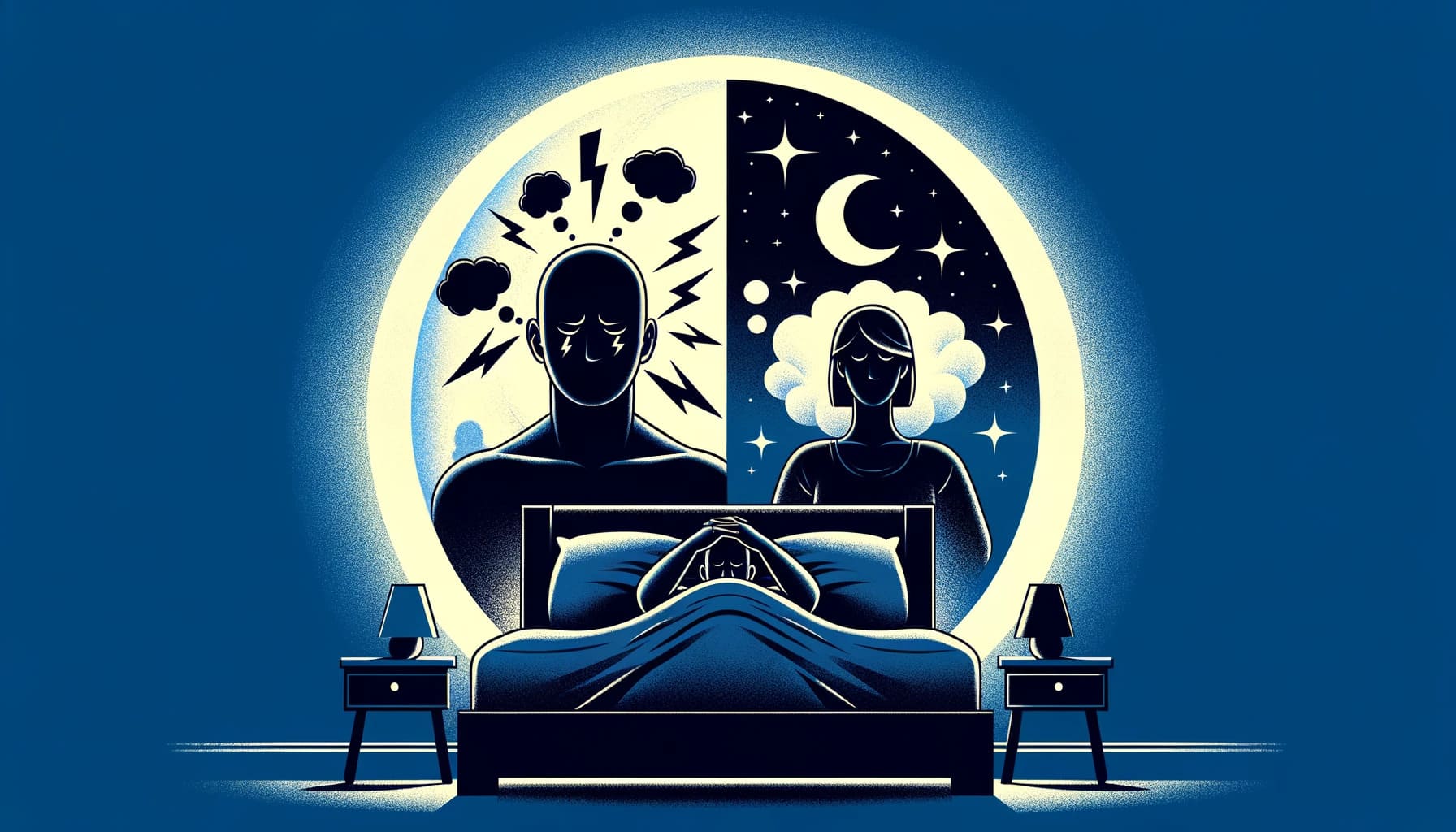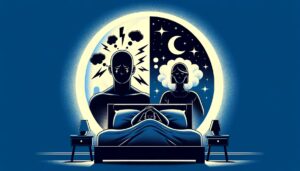Understanding Frustration’s Effect on Sleep
Tossing and turning while feeling frustrated is a common thread in the tapestry of sleep troubles. Frustration not only clouds the mind but can also have profound effects on your sleep cycle, turning what should be a time of rest into a night of restlessness. Exploring the psychological and physiological repercussions of frustration helps us understand why managing it is pivotal to achieving quality sleep.
Psychological Impact of Frustration on the Mind and Body
Frustration often kicks our brain into high gear, ruminating over the events or interactions that led to those feelings. This mental whirlwind can trigger the body’s stress response, releasing adrenaline and cortisol, which are notoriously effective at keeping us awake. It’s a classic case of the mind and body linking arms to postpone sleep.
Key psychological effects include:
- Heightened alertness: Ideal for problem-solving, not for sleeping.
- Increased heart rate: Prepares you for action rather than relaxation.
- Elevated stress levels: Prolonged exposure can lead to chronic insomnia.
Disruption of the Natural Sleep-Wake Cycle
The autonomic nervous system, which plays a key role in controlling sleep and wakefulness, becomes dysregulated when high stress and anxiety levels, like those caused by intense frustration, tip the balance. This can shift the natural cycle, making it difficult not only to fall asleep but also to experience deep, restorative sleep.
Relaxation Techniques to Combat Frustration

A frustrated person laying on a bed in a dark room, trying to fall asleep.
When frustration bubbles up, calming the mind becomes crucial. Engaging in effective relaxation techniques before bed can transition you from a state of tension to one of tranquility, making the journey to dreamland smoother and quicker.
Deep Breathing Exercises
Deep breathing is a simple yet powerful way to reduce tension and invite calmness. Practicing the following routine nightly can set the stage for relaxation:
- Sit or lie comfortably.
- Inhale slowly and deeply through your nose, feeling your stomach rise.
- Hold your breath for a few seconds.
- Exhale slowly through your mouth, envisioning stress leaving your body.
- Repeat several times until you feel more relaxed.
Progressive Muscle Relaxation
This technique reduces physical discomfort and muscular tension, clearing a path to serene slumber. Here’s how to get started:
- Find a comfortable position.
- Tense each muscle group for 5-10 seconds, then relax for 15-20 seconds.
- Progress from your toes upward to your facial muscles.
- Focus on the release of tension with each exhale.
Visualization Techniques
Visualizing a calm, peaceful setting can divert your mind from frustrating thoughts. Picture a scene that feels restorative to you, like a quiet beach or a serene forest, and allow yourself to become mentally and emotionally absorbed in this place of tranquility.
Optimizing Sleep Hygiene for Better Rest

Discover herbal remedies to sleep better and cure insomnia when stressed.
Optimal sleep hygiene can greatly enhance your nightly rest, particularly when frustration tries to claim center stage. Simple modifications to your sleep environment and pre-bedtime activities can make significant differences.
Importance of a Soothing Sleep Environment
The right environment is crucial for inviting sleep, especially when your mind is buzzing. Consider making these adjustments:
- Keep your bedroom cool, dark, and quiet.
- Invest in comfortable, supportive mattresses and pillows.
- Remove electronic devices that emit stimulating blue light.
Relaxing Pre-Bedtime Activities and Routines
Establish a soothing routine to help signal to your body that it’s time to wind down. Activities might include:
- Reading a book by soft light.
- Taking a warm bath to elevate body temperature slightly, subsequently signaling it’s time to cool down and sleep.
- Listening to gentle, soothing music or white noise.
The Role of Electronics in Exacerbating Frustration Before Sleep
The lure of smartphones and tablets can be strong, but their usage before bed can significantly interfere with your ability to fall asleep. The blue light emitted from screens can inhibit the production of melatonin, the hormone responsible for sleep. It’s best to turn these devices off at least an hour before bedtime to ensure they don’t add to your frustrations by keeping you awake.
Mindfulness and Meditation for Better Sleep
Embarking on a journey toward better sleep can often start with the mind itself, particularly through the practices of mindfulness and meditation. These techniques not only help manage emotions more effectively but also enhance overall sleep quality.
Getting Started with Mindfulness Meditation Specifically for Pre-Sleep
To begin with mindfulness, it’s crucial to create a calming pre-sleep ritual that fosters both mental and physical relaxation. Here is a simple meditation technique to get you started:
- Choose a quiet and comfortable spot, away from distractions.
- Sit or lie down and close your eyes, focusing on deep, slow breathing.
- Observe your thoughts and feelings, acknowledging them without judgment and gently guiding your attention back to your breath.
- End your session by slowly opening your eyes and adjusting to your surroundings.
Practicing mindfulness meditation for just a few minutes each night can significantly diminish the agitation that frustration brings, making it easier to slip into a peaceful slumber.
The Impact of Meditation on Emotional Regulation and Sleep Quality
Meditation not only helps in calming the mind but also plays a profound role in regulating emotions, which is crucial when you’re feeling frustrated. By fostering a greater awareness of your thoughts and reactions, meditation can help you manage stress more effectively, leading to improved sleep patterns.
Studies show that consistent meditation can enhance the quality of sleep, reduce the time it takes to fall asleep, and decrease instances of waking up during the night. Such improvements are especially beneficial for those who struggle with sleep disturbances related to emotional stress.
Lifestyle Tweaks for Reduced Frustration and Enhanced Sleep
Adjusting daily habits can have a direct impact on both your mental state and your sleep quality. Simple lifestyle changes can help mitigate frustration and promote a more restful night.
How Exercise Influences Stress and Sleep
Regular physical activity is a powerful tool for stress reduction and, consequently, better sleep. Exercise helps to:
- Release endorphins, which are natural stress fighters.
- Improve physical health, making it easier to fall asleep and stay asleep.
- Regulate your mood, reducing feelings of frustration and anxiety.
Incorporating exercise into your routine doesn’t mean you need to engage in intensive workouts. Even light activities like walking or yoga can significantly improve your sleep quality.
Diet and Its Connection to Sleep
What you eat has a direct impact on how you sleep. Consider these points:
- Limit caffeine and sugar intake especially in the hours leading up to bedtime.
- Incorporate more magnesium-rich foods like almonds and spinach, which can promote relaxation.
- Maintain a balanced diet to stabilize your energy levels and mood throughout the day.
Benefits of a Regular Sleep Schedule and Limited Caffeine
Sticking to a consistent sleep schedule sets your body’s internal clock to expect rest at certain times, fostering quicker, more effective sleep. Additionally, moderating caffeine consumption can prevent your mind from becoming overly active at night, making it easier to unwind when it’s time to sleep.
Cognitive Behavioral Practices for Sleep Improvement
Cognitive Behavioral Therapy for Insomnia (CBT-I) is a structured program that helps you identify and replace thoughts and behaviors that cause or worsen sleep problems with habits that promote sound sleep.
Cognitive Restructuring to Alter Sleep-Disruptive Thoughts
Cognitive restructuring involves:
- Identifying negative, false, or sleep-disruptive thoughts.
- Challenging these thoughts and replacing them with more positive or realistic ones.
- Practicing these techniques regularly, which can significantly reduce bedtime anxiety and frustration.
Introduction to Relaxation Training Methods
Relaxation training methods might include:
- Guided imagery, where you visualize a peaceful scene to distract your mind from frustrating thoughts.
- Abdominal breathing exercises, which help reduce the physical symptoms of stress.
Effective Sleep Scheduling and Its Benefits
Consistent sleep scheduling not only reinforces your body’s sleep-wake cycle but also increases the quality of sleep you get. Try going to bed and waking up at the same time every day, even on weekends.
Seeking Professional Help and When to Do It
Recognizing when to seek help from a professional can be crucial if your sleep problems persist.
Indicators for When to Seek Professional Advice
You should consider professional help if:
- Your sleep issues persist for longer than a month.
- Your daily functioning is impaired due to lack of sleep.
- You experience severe mood swings or behavioral changes.
Potential Professional Interventions for Sleep Issues Related to Frustration
A professional might recommend:
- Cognitive Behavioral Therapy (CBT).
- Medication, if deemed necessary and appropriate.
- Lifestyle and environmental adjustments.
Professional guidance is beneficial when self-help strategies alone do not resolve sleep disturbances.
In conclusion, while frustration can significantly disrupt sleep, multiple strategies ranging from mindfulness and meditation to cognitive-behavioral practices and lifestyle adjustments can be effectively employed to combat this. Embracing these approaches can lead not only to improved sleep but also to enhanced overall mental health and well-being. Remember, combining several techniques may yield the best results, and if challenges persist, seeking professional advice is a prudent next step.




0 Comments